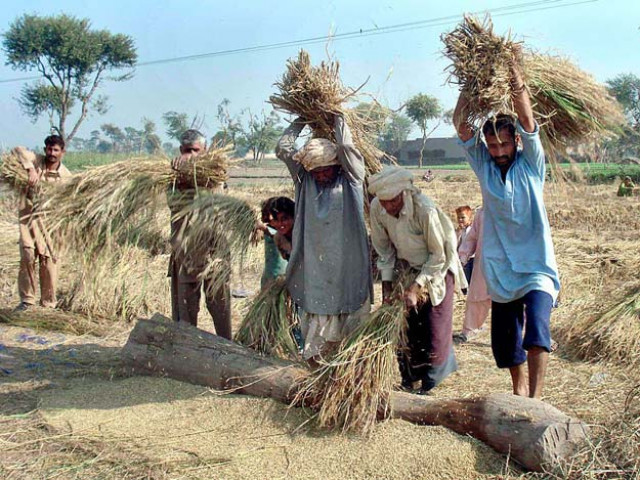Heatwaves, water shortage erode agri incomes
High input costs, low returns on harvest add to farmers' miseries

The agricultural growth in terms of income of the farmers witnessed a downward trend in 2024 owing to multiple factors like heatwaves, expensive inputs and a decline in the crop prices, according to the Sindh Abadgar Board which lobbies for rights of agriculturists.
The board's meeting, presided in Hyderabad by Syed Mahmood Nawaz Shah on Sunday, also blamed the provincial government for a slash in their incomes because of its deregulatory measures which they argued were implemented in haste.
The growers pointed out that the prices of cotton, rice, wheat and sugarcane, besides other crops, lived through a considerable decline in 2024 if compared with 2023. The farmers sold cotton crop for Rs7,000 to Rs10,000 in 2023 but the prices lowered to Rs7,000 to Rs8,000 in the following year.
Likewise, rice fetched between Rs2,400 to Rs2,800 in the previous year against Rs3,000 to Rs3,400 over a year ago. The wheat farmers also bore the losses occasioned by a drop in the rates from up to Rs4,100 per maund to as low as Rs2,800 in the last year. The sugarcane was sold at Rs400 in 2024 and at Rs425 in 2023.
"This happened mostly due to one sided and abrupt deregulation implemented by the government," the meeting lamented. The farmers contended that deregulation of prices, which used to be fixed by the government, was a policy measure which should have been prepared by consultation with the stakeholders and adequate planning.
"With the absence of competitive markets, storage, processing and ban on exports, the government has literally thrown the agricultural produce to the middle man, hoarders and very large monopolistic processors," the farmers said. They added that except rice export of other commodities is either not allowed or is heavily regulated.
The board found it strange that instead of incentivizing the domestic production of crops, the government in Pakistan penalizing the sector. They corroborated their assertion with the example of the locally produced cotton crop which is subjected to 18% tax while the imported cotton is provided expensive dollars for foreign payments besides tax free import.
Water shortage
The farmers whose lands are irrigated by Nara and Dadu canals complained of witnessing water scarcity even before the annual canal closure for maintenance is scheduled to begin from January 6 to 21. They briefed the meeting that the water flows have been cut in the two canals 15 to 20 days ahead of the annual closure. Nara, one of the biggest canals springing from Sukkur barrage, irrigates over two million acres of land.
The farmers demanded that the duration of the closure for Nara should be curtailed from 16 days to 10 days. They pointed out that even if the canal is reopened on January 15, it will take seven days for water to reach the tail end areas of Nara.
Meanwhile, the designed capacity of Dadu canal is to irrigate around 500,000 acres. But due to silt and leakages, the capacity stands much reduced. The farmer's said Dadu canal not only required continuous supply but also measures to address the silt and leakages problem. The board suggested that the government should take advantage of the closure and perform the desilting on fast track basis.
Syed Nadeem Shah, Muhammad Malook Nizamani, Imran Bozdar, Ahsan Arbab, Yar Muhammad Laghari, Mustafa Nawaz Shah and other representatives of farmers attended the meeting.


















COMMENTS
Comments are moderated and generally will be posted if they are on-topic and not abusive.
For more information, please see our Comments FAQ